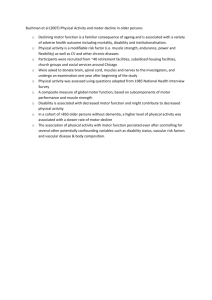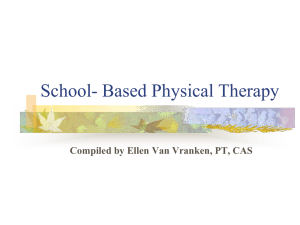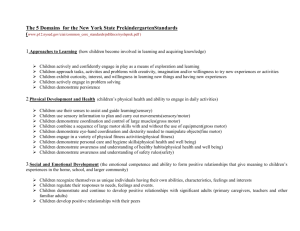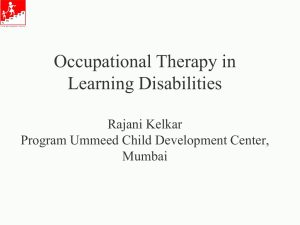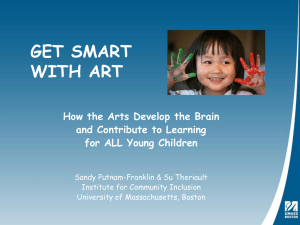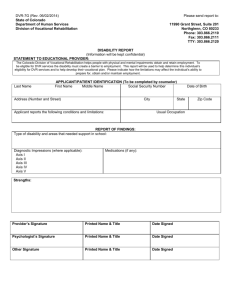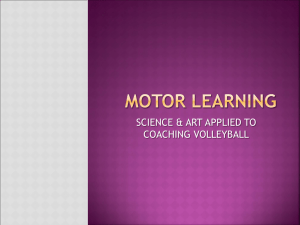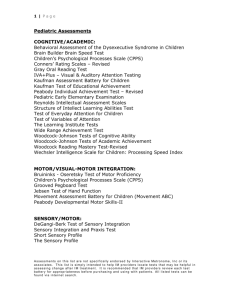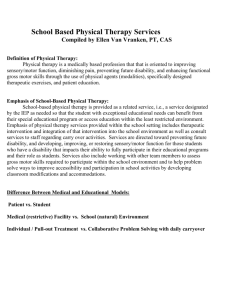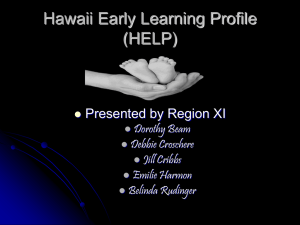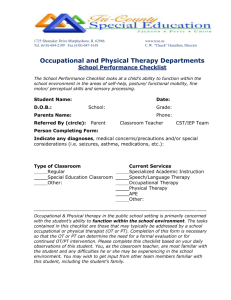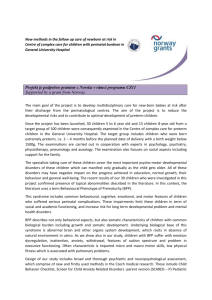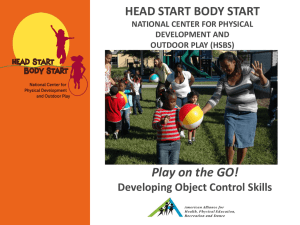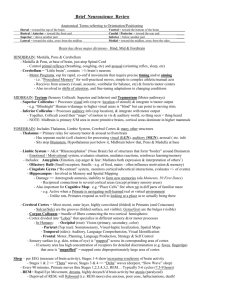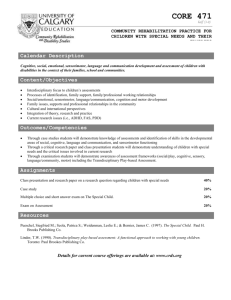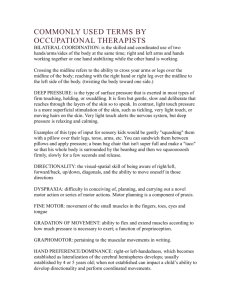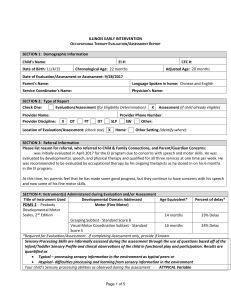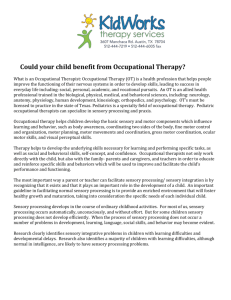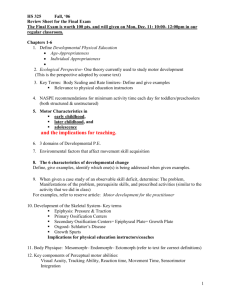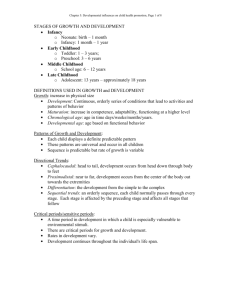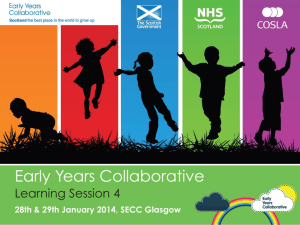Terms O-R - Wyckoff School District
advertisement
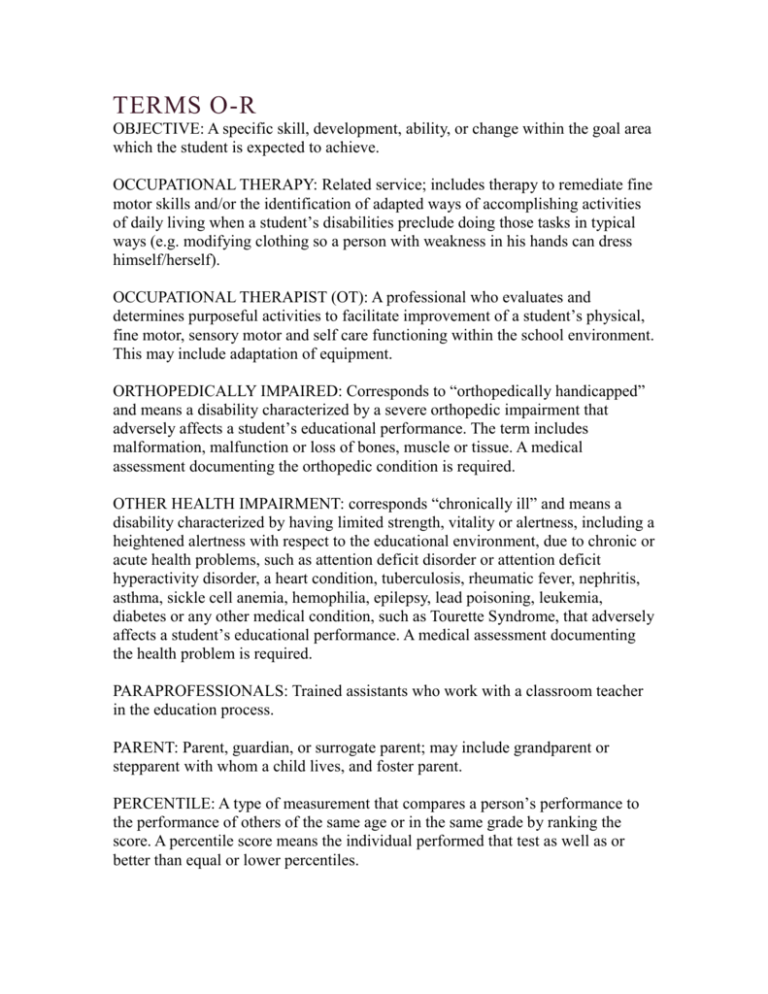
TERMS O-R OBJECTIVE: A specific skill, development, ability, or change within the goal area which the student is expected to achieve. OCCUPATIONAL THERAPY: Related service; includes therapy to remediate fine motor skills and/or the identification of adapted ways of accomplishing activities of daily living when a student’s disabilities preclude doing those tasks in typical ways (e.g. modifying clothing so a person with weakness in his hands can dress himself/herself). OCCUPATIONAL THERAPIST (OT): A professional who evaluates and determines purposeful activities to facilitate improvement of a student’s physical, fine motor, sensory motor and self care functioning within the school environment. This may include adaptation of equipment. ORTHOPEDICALLY IMPAIRED: Corresponds to “orthopedically handicapped” and means a disability characterized by a severe orthopedic impairment that adversely affects a student’s educational performance. The term includes malformation, malfunction or loss of bones, muscle or tissue. A medical assessment documenting the orthopedic condition is required. OTHER HEALTH IMPAIRMENT: corresponds “chronically ill” and means a disability characterized by having limited strength, vitality or alertness, including a heightened alertness with respect to the educational environment, due to chronic or acute health problems, such as attention deficit disorder or attention deficit hyperactivity disorder, a heart condition, tuberculosis, rheumatic fever, nephritis, asthma, sickle cell anemia, hemophilia, epilepsy, lead poisoning, leukemia, diabetes or any other medical condition, such as Tourette Syndrome, that adversely affects a student’s educational performance. A medical assessment documenting the health problem is required. PARAPROFESSIONALS: Trained assistants who work with a classroom teacher in the education process. PARENT: Parent, guardian, or surrogate parent; may include grandparent or stepparent with whom a child lives, and foster parent. PERCENTILE: A type of measurement that compares a person’s performance to the performance of others of the same age or in the same grade by ranking the score. A percentile score means the individual performed that test as well as or better than equal or lower percentiles. PERCEPTION: Ability to process and comprehend information one receives via the senses. PERCEPTUAL-MOTOR DISORDER: A sensory perception deficiency receiving, processing or responding to sensory information about one’s environment, in turn causing problems with comprehension, memory and the perceptual motor skills needed to read, write and master arithmetic. PERCEPTUAL SKILLS: The ability to select, organize, and understand information coming in through the sense. (hearing, seeing, touching, smelling, tasting) PHYSICAL THERAPY: Related service; includes therapy to remediate gross motor skills. PHYSICAL THERAPIST (PT): A professional who assesses and treats a student to improve his level of functioning, mainly in the area of mobility and walking skills, within the school environment. POSITIVE REINFORCEMENT: Any stimulus or event that occurs after a desired behavior has been exhibited and increases the possibility of that behavior occurring in the future. PRAGMATICS: Language system concerned with functional language use, including the ability to engage in a conversation through appropriate use of nonverbal behaviors such as maintaining eye contact and taking turns speaking and listening to others. PRAXIS PLANNING: Ability to plan and execute tasks requiring motor skills. PRESCHOOL CHILD WITH A DISABILITY: Corresponds to preschool handicapped and means a child between the ages of three and five experiencing developmental delay, as measured by appropriate diagnostic instruments and procedures, in one or more of the areas i through v below, and requires special education and related services. When utilizing a standardized assessment or criterion-referenced measure to determine eligibility, a developmental delay shall mean a 33 percent delay in one developmental area, or a 25 percent delay in two or more developmental areas. • Physical, including gross motor, fine motor and sensory (vision and hearing); • Cognitive; • Communication; • Social, and emotional; and • Apaptive PRIOR WRITTEN NOTICE: Required written notice to parents when school proposes to initiate or change, or refuses to initiate or change, the identification, evaluation, or educational placement of the child. PROCEDURAL WRITTEN NOTICE: Requirement that schools provide full easily understood explanation of procedural safeguards that describe parent’s right to an independent educational evaluation, to examine records, to request mediation and due process. PROMPTING: Instructional technique in which a cue --- visual, auditory or physical --- is presented in order to facilitate successful completion of a task or performance of a behavior. PROPRIOCEPTIVE SENSE: a student’s subconscious awareness of body position, either when in motion or still. PSYCHOLOGICAL EVALUATION: The portion of a child’s overall special education evaluation that tests general aptitudes and abilities, eye-hand coordination, social skills, emotional development and thinking skills. PSYCHOLOGICAL SERVICES: Related service; includes administering psychological and educational tests, interpreting test results, interpreting child behavior related to learning. PSYCHOLOGIST: A professional trained to administer psychological tests, interpret results, recommend eligibility and develop programs/services for students. REEVALUATION: Periodic evaluation of a student already identified as IDEA eligible. REFERRAL: A formal notification to the local school made by a family, a teacher or other professional, that a child is experiencing educational difficulties which may require a full special education evaluation. REGRESSION-RECOUPMENT: The amount of loss of skills a child experiences over an instructional break and the amount of time it takes him/her to recover the lost skills. RELATED SERVICES: Services that are necessary for child to benefit from special education; includes speech-language services, psychological services, physical and occupational therapy, early identification and assessment, counseling, orientation and mobility services, school health services, social work services, parent counseling and training. RELIABILITY OF TESTS: Refers to how consistently a test yields similar results across time, raters, and items. If a particular test is given at several different times to different students and is administered and scored by different people, and if the test questions do not change, the test is reliable if the raters basically agree on the scores of the test takers. REMEDIATION: An educational program designed to teach children to overcome some deficit or disability through education and training. RESOURCE ROOM: A classroom program designed for students who require a part of their instructional day in special education in areas such as language arts and mathematics.
